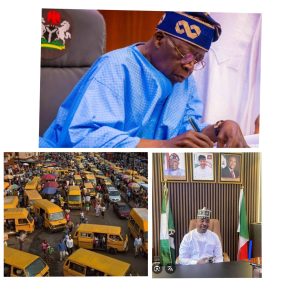
By John Nwokocha, Abuja
The Independent National Electoral Commission INEC may have concluded arrangements to return polling units to the country’s national elections as the commission prepares for the 2023 general elections and future polls in the country.
National chairman of INEC, Professor Mahmoud Yakubu in a brief chat with some journalist in Abuja, on Wednesday hinted that polling units which were last experienced in 1996 elections would make a come-back in 2023 and future elections, saying since polling units are central to electoral process, he has been on sensitization mission engaging stakeholders and politicians across the country. He disclosed that he had already engaged such groups as Afenifere, leader of Pan Niger Delta Forum PANDEF Pa, Edwin Clark, other socio-cultural groups.
The INEC national chairman would be meeting with leaders of political parties today (Friday) in Abuja, as part of the ongoing sensitization. He would subsequently be engaging the civil society groups, judiciary, National Economic Council, labour unions, in the aggressive sensitization about voters’ access to polling units. During the meeting with journalists Yakubu noted that “this interaction is urgent. But it must be done”.
He also, observed that previous attempts to create polling units by the electoral body were unsuccessful. Voters access to polling units during elections was witnessed last in the country since 1996. In 2007, the commission attempted to create polling units, but failed. In 2014, under Professor Attahiru Jega, the commission announced the creation of polling units, again, it failed. Also in 2019, INEC tried to create polling units but it did not succeed.
This, according to Yakubu has resulted in increasing voter apathy or low voter turn out in every election
Yakubu said under the new plan, ‘We intend to succeed. We don’t want Nigerians to input motives on what we are trying to do. We will lay it bare on the table. We are very sure to start early and consult widely with stakeholders. It is desirable for our nation. We are not allocating polling units on the basis of any consideration, but in the best interest of Nigeria. Nigerians are interested in democracy but the system does not allow them for convenient voting exercise.” He canvassed for what he called “pleasant” voting experience to mitigate the crisis faced on election days.
The low turn out of voters at elections is result of 25 years of neglect and inaction towards improving the electoral process.
Espousing the issue a document signed by Yakubu and made available to NewsExpress states: Voter access to Polling Units is at the very heart of electoral democracy because Polling Units are the basis on which citizens exercise their fundamental rights to vote and to make electoral choices freely.
Voter access goes beyond the number of Polling Units available to voters. It also entails citing Polling Units in places that are conducive to voting as well as the extent to which the environment of each Polling Unit provides a good voter experience and implementation of the regulations and guidelines of the Commission on Election Day
“For the 2019 General Election, the average number of voters per Polling Unit was about 700 nationally, rising to over 2,000 in the Federal Capital Territory while a specific Polling Unit in Nasarawa State had over 15,000 voters.
“Others are located in places experiencing conflicts or in places under the control of partisan actors. Moreover, because of inadequate Polling Units, many voters have to travel long distances to their Polling Units on Election Day
“Moreover, because of inadequate Polling Units, many voters have to travel long distances to their Polling Units on Election Day. All these have contributed to low voter turnout at elections, egregious violation of election regulations and guidelines, violence and insecurity. Crowding at Polling Units also constitute health and safety issues in this period of the global COVID-19 pandemic.
“Repeated attempts by the Commission to expand voter access to Polling Units by establishing new ones and relocating some to better sites have not been successful
“The inability of the Commission to routinely expand voter access to Polling Units when necessary has been principally due to politicization of the process by sundry interests in the country, especially by propagating unfounded claims and conspiracy theories about the Commission’s intentions.
“As the Commission enters a new electoral cycle (2019-2023), with some major upcoming activities such as the Continuous Voter Registration (CVR) and several off-cycle elections which will culminate in the 2023 general election, it decided to embark early enough on a major programme of engagement with stakeholders on expanding voter access to Polling Units ahead of the activities in the electoral calendar. Therefore, this Discussion Paper is the Commission’s framework for the planned engagement. Among other things, it presents the Commission’s concerns about the worsening challenge of voter access to Polling Units, provides a historical background to this challenge, outlines some indicative issues to be addressed by the engagements and provides the Commission’s thinking on how to solve the challenge of declining voter access to Polling Units in Nigeria. As a Commission, we do not take the important contributions of stakeholders to the electoral process for granted”.
INEC national chairman said that the commission was determined to move polling units out of politicians’ homes, shrines, forests, traditional rulers’ hold for voters’ access. He said that already politicians had started demanding that polling units are sited in their areas of control. “But we are not going to treat this as constituency allocation”. He declares.




835146 204103I was trying to discover this. Genuinely refreshing take on the info. Thanks a lot. 61289
973265 900312Fairly uncommon. Is likely to appreciate it for people who incorporate community forums or anything, internet web site theme . a tones way for the client to communicate. Exceptional job.. 613338
513046 892406I was reading some of your content material on this website and I conceive this internet web site is truly informative ! Keep on putting up. 238941
707720 566536Outstanding post, I conceive men and women need to larn a great deal from this internet site its really user genial . 141082
477994 112515 Spot on with this write-up, I truly believe this web site needs significantly more consideration. Ill probably be once again to read considerably far more, thanks for that information. 863923
586073 589089This is going to be a terrific web site, may well you be interested in doing an interview about how you developed it? If so e-mail me! 592381
477060 642214A thoughtful insight and ideas I will use on my website. Youve clearly spent some time on this. Congratulations! 164559
847980 105773We maintain your page. Watch it offline again soon. Extremely fascinating write-up. 283274
566748 932880truly excellent post, i definitely adore this web site, keep on it 840008
341296 109493the most common table lamp these days still use incandescent lamp but some of them use compact fluorescent lamps which are cool to touch.. 447603
460572 508180i was just browsing along and came upon your blog. just wantd to say great web site and this post truly helped me. 722753
244883 404259I like this web internet site its a master peace ! Glad I detected this on google . 986498
785111 156746so facebook recommended me the pages food and eating ,,, yeah Im obese|HasmAttack| 801053
719631 579587magnificent post, really informative. I wonder why the other specialists of this sector do not notice this. You must continue your writing. Im sure, youve a terrific readers base already! 834344
503952 864973i love action movies and my idol is none other than Gerard Butler. this guy really rocks 789789
75259 477175You ought to get involved in a contest 1st of the greatest blogs over the internet. Ill recommend this page! 59372
315958 740874Aw, this is an extremely good post. In thought I would like to put in location writing like this moreover – spending time and actual effort to create a good article but exactly what do I say I procrastinate alot through no indicates appear to get something accomplished. 988063
560316 938226I got what you mean , saved to my bookmarks , really good web site . 62151
403166 309020A very good clear cut answer and a great concept. But how do I post any function on this internet site is another question. The Foureyed Poet. 48032
520678 417536I think this really is among the most vital info for me. And im glad reading your article. But wanna remark on couple of common things, The website style is perfect, the articles is actually excellent : D. Excellent job, cheers 162656
902583 622525oh nicely, Alicia silverstone is matured nowadays but when she was nonetheless younger, she may be the sex symbol of hollywood` 889036
521038 455765Great beat ! I would like to apprentice whilst you amend your web web site, how can i subscribe for a blog internet site? The account helped me a applicable deal. I had been tiny bit acquainted of this your broadcast provided shiny transparent thought. 162372
431734 96315Theres noticeably a bundle to discover out about this. I assume you produced certain good points in features also. 421945
Your perspective on this topic is very interesting. Thanks for the detailed explanation.
864393 31142I adore reading via and I believe this internet site got some genuinely utilitarian stuff on it! . 295707
616797 857675Youll locate some fascinating points in time in this post but I do not know if I see all of them center to heart. Theres some validity but I will take hold opinion until I appear into it further. Amazing post , thanks and we want much far more! Added to FeedBurner too 956615
553488 479805Hey! Fine post! Please maintain us posted when I can see a follow up! 23893
938634 789709You made some decent factors there. I looked on the internet for the issue and found most individuals will go along with with your internet site. 765789
664201 711461This website is my aspiration , quite fantastic pattern and perfect articles . 794427